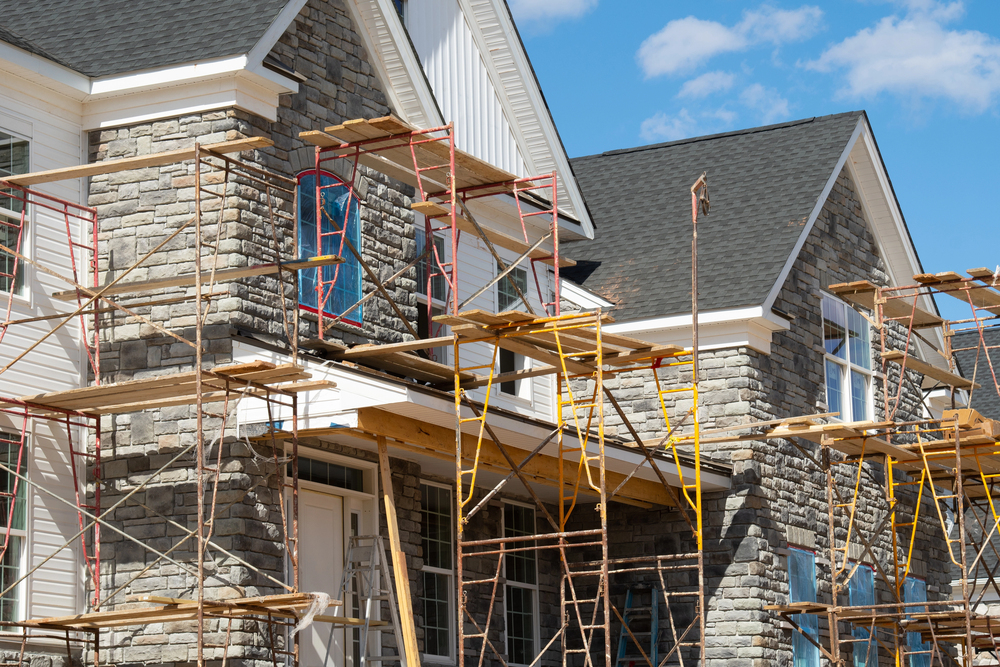Do Homeowners Policies Exclude Theft of Personal Property During Renovations?

A homeowners client is building an addition on their secondary home, which is still occupied and furnished. The carrier says there is no coverage for theft of personal property or theft of building materials during the construction, based on the exclusion:
9. Theft:
b. This peril does not include loss caused by theft:
(2) in or to a “dwelling” under construction, or of materials and supplies for use in the construction until the “dwelling” is finished and occupied;
The agent understands why there is no coverage for theft of building materials, but doesn’t think it makes sense that all personal property—the insured’s furniture, clothing, household items—is being included in the exclusion.
Q: Is the insured out of luck for their regular personal property? Where can the agent find coverage for personal property that wouldn’t have a similar exclusion?
Response 1: I think the carrier has a very narrow and incorrect interpretation of the theft exclusion. Suppose someone wanted to add a deck, finish their basement or remodel their kitchen. Would the carrier then exclude theft coverage if someone broke into the house and stole household personal furnishings? I don’t think so.
While I would be surprised if the carrier would deny a claim of this nature—other than the building materials—someone from the carrier has given you an opinion. I would certainly appeal it to a higher level.

The Bobby Salmon Relief Fund
Response 2: Is the insured occupying the secondary home in their usual way—seasonally—while the renovation is in progress? If occupancy is suspended while work takes place, then the limitation may apply. I think you could argue that the dwelling is being renovated, rather than being under construction, but that’s lawyer work.
On the other hand, if the insured continues to occupy it as usual—on weekends, for instance— then I agree that the limitation does not apply. That opinion, however, is worthless. The carrier has already said they won’t pay and you have to take them at their word, wrong though they may be. If you can’t change their minds, then you need to find a carrier with a more enlightened view.
Response 3: I agree it doesn’t make sense. That would mean any time an insured is doing some construction on their home, the coverage for theft of personal property would disappear. The exclusion intends to remove the risk of theft when a dwelling under construction is still “open” and anyone could enter and steal items, or when it appears unfinished and unoccupied, increasing the temptation of theft. That is not the case here. You said the insured is still living there.
Speak with another of your carriers and see if you get a more reasonable interpretation of coverage. Tell this particular carrier that you can move the coverage to another carrier and urge them to take another look. In the worst-case scenario, you can add a personal property floater to the items most likely to be stolen, but that would be a cost that an insured should not have to bear.
Does this carrier also insure their primary residence? If not, check with that carrier. Most policies extend an additional limit—often 10%—to another home, but they do not provide theft coverage unless the insured is residing there at the time. It would still have the same under-construction exclusion, but a different carrier may not interpret it the way this one does.
What Do the Experts Think?
Response 4: Unfortunately, based on the definition, I tend to agree with the carrier. To determine whether the event is a theft, the questions that must be asked are:
- Did the theft occur in a dwelling under construction?
- Did the theft occur to a dwelling under construction?
- Was the theft of materials and supplies for use in the construction?
Because the exclusion says “in or to,” an affirmative answer to any of those questions means the loss is not included in the theft peril unless and until the dwelling is finished and occupied. Furniture or electronics stolen from a home under construction is a theft “in” a dwelling under construction. Therefore, the answer to the first question is yes. If the answer to the question “Was the dwelling finished and occupied?” is no, the loss was not a theft as the policy defines that peril, and therefore coverage does not apply.
The homeowner may want to negotiate with the contractor so that the contract requires the contractor to insure against theft of the owner’s personal property.
Personal property of the insured, particularly valuable personal property that is easily stolen, may need to be secured in another insured space that is not under renovation. Since this is a second home, ask your underwriter if a self-storage space needs to be scheduled.
Response 5: I agree with the agent’s interpretation. When you see “lists or tabulated series of terms in a policy, there are two interpretive legal principles─ejusdem generis and noscitur a sociis,” according to “When Words Collide: Resolving Insurance Coverage and Claims Disputes” by Bill Wilson.
Specifically, the “noscitur a sociis” principle, which means “it is known by the company it keeps,” applies. The meaning of a term in a list is understood by its context. This would mean that, because it discusses construction materials, those would be the ones that are excluded. If the home is occupied, the second part of the exclusion also doesn’t apply, even though it is under construction.
This question was originally submitted by an agent through the Big “I” Virtual University’s (VU) Ask an Expert service, with responses curated from multiple VU faculty members. Answers to other coverage questions are available on the VU website. If you need help accessing the website, request login information.
This article is intended for general informational purposes only, and any opinions expressed are solely those of the author(s). The article is provided “as is” with no warranties or representations of any kind, and any liability is disclaimed that is in any way connected to reliance on or use of the information contained therein. The article is not intended to constitute and should not be considered legal or other professional advice, nor shall it serve as a substitute for obtaining such advice. If specific expert advice is required or desired, the services of an appropriate, competent professional, such as an attorney or accountant, should be sought.









